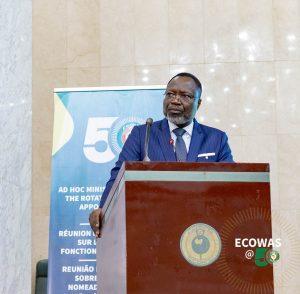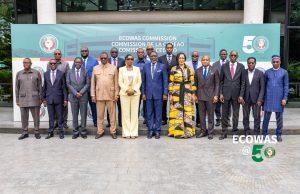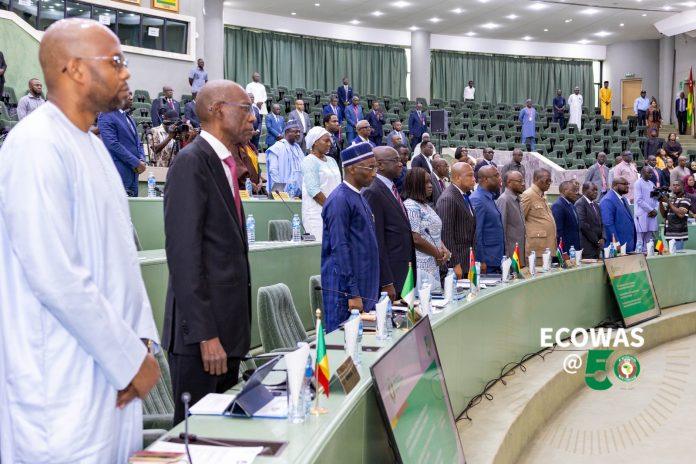Members of the Ad hoc Ministerial Committee of the Economic Community of West African States, ECOWAS, have convened in Abuja, Nigeria, for a two-day meeting to chart a course for the proposal and allocation of statutory positions for its future appointees from member countries.
The rotation of statutory appointees adheres to a principle of cyclical representation among member nations within executive bodies, as delineated in the legal texts and regulations of the regional organization, with each term being non-renewable and lasting four years.

Speaking at the opening, the ECOWAS Commission President, Dr. Umar Touray, said they were committed to ensuring that the Ad hoc committee carries out its task with ease and more effectively.
“This exercise goes to the heart of the values that underpin our Community’s regional balance, fairness, and a shared commitment to integration.
“It is the expectation that the ad hoc Committee will review this proposal with the broader interest of the Community at heart. The Commission stands ready to provide any services that would ease the work of the Committee,” he said.
According to Dr. Touray, the June 2025 resolution from the 94th Ordinary Session of the ECOWAS Council of Ministers mandated the formation of the ad hoc Committee to review the Commission’s proposals.
“The memo was prepared, taking into account the 2012 Supplementary Act on the Modalities for the Allocation of Statutory Positions and historical data on allocations.
“To facilitate this process, the Council, in June, established this six-member ad hoc committee, comprising of the Republics of Benin, Cote d’Ivoire, Gambia, Ghana, Guinea Bissau, Nigeria, Senegal, and Togo, to review the proposed allocation of the Commission and submit it to Council for consideration, and ultimately to the ECOWAS Authority for decision. We trust the Committee will examine this proposal with the broader interest of our Community in mind,” he said.
The Commission President added that: “At the end of the meeting, the Commission will be presenting a memo setting out the framework for the allocation of the statutory positions for your consideration. The memo was prepared taking into account the provisions of the 2012 Supplementary Act and historical data on the allocations of the statutory positions of the institutions since 1975,” he added.

Declaring the event open, Nigeria’s Minister of State for Foreign Affairs, Ambassador Bianca Odumegwu- Ojukwu, who chairs the Committee, noted that the task ahead for regional integration is a shared responsibility.
“Our presence here today reflects the significance we collectively place on the crucial task before us, one that lies at the heart of our regional integration agenda. Our gathering also reaffirms our shared commitment to upholding the principles of equity, regional balance, and institutional integrity within the governance framework of our Community,” she said
She reiterated Nigeria’s commitment to reinforcing unity and justice within ECOWAS Region.
“We would also recall that Nigeria, as a long standing and committed Member State, played a significant role in shaping and supporting the institutional reforms which culminated in the current and more streamlined structure.
“These reforms were aimed at reducing operational costs, optimizing administrative efficiency, and enhancing the effectiveness and impact of ECOWAS programmes across the region.
“I want to, therefore assure you that as part of our enduring commitment to the ideals of regional integration and solidarity, Nigeria will continue to assume its traditional leadership role by constructively engaging with all Member States to build consensus and ensure that our collective decisions reflect both equity and a shared vision for the future of our Community”, she said .

Ambassador Odumegwu- Ojukwu emphasised the need for open-minded and constructive dialogue as the committee approaches discussions.
“It is equally important to underscore that our membership of this Ad-hoc Committee should not be construed as a pathway to positions of leadership within the ECOWAS Commission. Rather, our engagement should be guided by the principles of regional solidarity, prioritizing the collective interest of the Community above national aspirations.
“In doing so, we will contribute to fostering deeper unity, mutual trust, and a shared sense of purpose among our citizens. Let us remain focused on ensuring that the outcomes of our engagements are both meaningful and impactful for the future of our region,” she added.
It is expected that discussions at the Ad hoc meeting will be are geared towards shaping the ECOWAS leadership landscape, strengthen unity, inclusiveness, and long-term regional integration.

